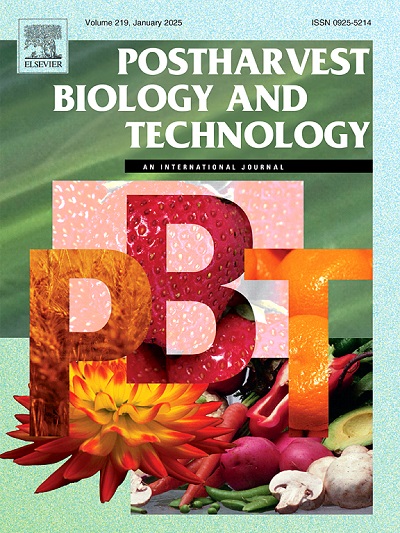1-MCP regulates taste development in cold-stored peach fruit through modulation of sugar, organic acid, and polyphenolic metabolism
IF 6.4
1区 农林科学
Q1 AGRONOMY
引用次数: 0
Abstract
1-Methylcyclopropene (1-MCP) shows promising application potential in cold storage preservation of fruits. Previous studies have shown that 1-MCP treatment can affect fruit flavor attributes during cold storage, with most research focusing on aroma, while studies on fruit taste are limited. This study investigated how 1-MCP treatment influences the taste profile in peach fruit during cold storage (4 ± 1 °C) and subsequent shelf life (20 ± 1 °C). Results showed that 1-MCP treatment effectively reduced chilling injury (CI) symptoms and maintained better fruit texture during storage. Electronic tongue analysis revealed that 1-MCP-treated fruit exhibited lower sweetness and bitterness, but higher sourness and umami taste compared to the control. Metabolomic analysis identified five key polyphenolic compounds (isokurarinone, isoquercetrin, catechin, 3-caffeoyl quinic acid, and 5-caffeoyl quinic acid) associated with bitterness formation, which showed strong binding affinities with human bitter taste receptors through molecular docking analysis. Transcriptomic analysis demonstrated that 1-MCP regulated fruit taste by modulating multiple metabolic pathways: suppressing sucrose degradation while promoting hexose phosphorylation in sugar metabolism, enhancing organic acid synthesis through upregulation of TCA cycle-related genes, and inhibiting phenylpropanoid metabolism pathway genes to reduce polyphenolic compound accumulation. Although 1-MCP effectively maintained fruit quality and reduced bitterness development during cold storage, the decreased sweetness might also affect consumer acceptance. Further research is needed to optimize 1-MCP treatment conditions for a better balance between preservation effects and taste formation.
求助全文
约1分钟内获得全文
求助全文
来源期刊

Postharvest Biology and Technology
农林科学-农艺学
CiteScore
12.00
自引率
11.40%
发文量
309
审稿时长
38 days
期刊介绍:
The journal is devoted exclusively to the publication of original papers, review articles and frontiers articles on biological and technological postharvest research. This includes the areas of postharvest storage, treatments and underpinning mechanisms, quality evaluation, packaging, handling and distribution of fresh horticultural crops including fruit, vegetables, flowers and nuts, but excluding grains, seeds and forages.
Papers reporting novel insights from fundamental and interdisciplinary research will be particularly encouraged. These disciplines include systems biology, bioinformatics, entomology, plant physiology, plant pathology, (bio)chemistry, engineering, modelling, and technologies for nondestructive testing.
Manuscripts on fresh food crops that will be further processed after postharvest storage, or on food processes beyond refrigeration, packaging and minimal processing will not be considered.
 求助内容:
求助内容: 应助结果提醒方式:
应助结果提醒方式:


